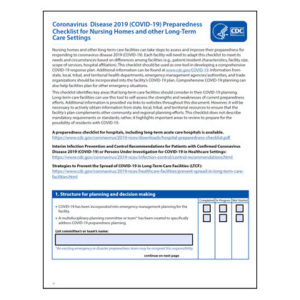Direct-care workers in the Washington spotlight
At least three developments in Washington over the past month or two could prove beneficial for home health agency workers and potentially affect long-term care (LTC) facilities that rely on direct-care workers to provide basic patient services.
First, in April, Rep. Matt Cartwright and Sen. Bob Casey, both Pennsylvania Democrats, introduced legislation they say will improve the quality and lower the cost of healthcare for older Americans. The bill, which they named the Improving Care for Vulnerable Older Citizens through Workforce Advance Act of 2014, would establish demonstration projects to test models of care that use direct-care workers in advanced roles.
Six different demo projects that focus on the coordination of care and delivery of medical services to elderly people with chronic diseases would be provided by the legislation. Direct-care workers would be given opportunities to advance their careers through additional training, increased compensation and expanded roles.
Of the demo projects, two would provide funding to train direct-care workers so they could take on “deeper clinical responsibilities” related to Alzheimer’s/dementia, congestive heart failure and diabetes. The others would focus on empowering them to promote smoother transitions among different settings, incorporating them as “essential members” of interdisciplinary teams, and helping them do more effective education of family caregivers. Among organizations eligible to participate would be LTC and rehabilitation facilities, home health agencies, managed care entities and hospitals.
Unfortunately, the prognosis for the Cartwright-Casey bill is not good. In fact, it would seem to be on life support. As of June 9, it had attracted only three co-sponsors in the House: Reps. Alan Grayson (D-FL), Sheila Jackson Lee (D-TX) and Charles Rangel (D-NY). It is pending before the House Education and Workforce Committee, and insiders give it zero chance of being enacted this year. Note the absence of any Republican co-sponsors, virtually essential if the bill is to advance in the GOP-controlled House.
The bill states that as of 2012, more than 41 million Americans were aged 65 years or more and that 75 percent suffer from chronic conditions “which require person-centered, coordinated care that helps them to live in a home- or community-based setting." It notes that in 2012, the Government Accountability Office found that 34 percent of Americans aged 60 years or more reported needing assistance performing activities of daily living. According to the bill’s language, direct-care workers provide 70 percent to 80 percent of the paid hands-on LTC and personal assistance received by elders and people with disabilities or other chronic conditions.
“They are the lifeline for those they serve, as well as for families and friends struggling to provide quality care,” the bill states.
The bill also notes that the majority of such workers are now employed in home- and community-based settings, rather than institutional facilities like skilled nursing facilities or hospitals. By 2020, it estimates, home- and community-based direct-care workers will outnumber facility workers by more than 2 to1.
Casey first introduced the legislation in 2011 and advocates, including PHI [the Paraprofessional Health Institute], had hoped to have its language included in the Older Americans Act reauthorization legislation. With that effort unsuccessful, the bill’s backers are now looking for another broader legislative “vehicle” to which it can be attached. Meanwhile, says Steve Edelstein, national policy director at PHI, efforts are under way to build support on Capitol Hill and with other organizations. “We think this is a valuable concept and can do some good,” he adds.
BACKGROUND CHECKS
The second development is a study by the Department of Health and Human Services Office of Inspector General reporting that 10 states have no background check requirement for home healthcare workers, and that of the 40 states that do, 26 allow an individual to work while his or her background is being checked.
Thirty-five states specify convictions that disqualify individuals from employment, and 16 states allow an individual who has been disqualified to submit an application to have his or her conviction(s) waived.
“The Centers for Medicare & Medicaid Services (CMS) may wish to use the information from this report as it administers the Nationwide Background Check Program,” observed the inspector general. “The report may also be useful to states that are considering establishing or enhancing background check requirements for home health agency employees.”
IMPROVING PAY
Finally, PHI, which strongly supports the Cartwright-Casey bill, in late May urged the U.S. Department of Labor (DOL) to avoid further delay in extending minimum wage and overtime protections to home care workers.
This past September, Labor Secretary Thomas Perez announced that after decades of being excluded from these protections, home care workers would be extended rights effective Jan. 1, 2015. The National Association of Medicaid Directors, however, has asked Perez to delay implementation of the rule change for another 18 months, citing concerns over “unforeseen issues [and] outstanding questions” pertaining to Medicaid.
But supporters of the change oppose that request.
“After 40 years of their exemption from core labor protections and decades of stops and starts in ending this egregious exclusion, justice delayed has been justice too-long denied for the two million-plus home care workers who benefit from the rule,” says a letter to DOL by supporting organizations.

Robert Gatty has more than 40 years of experience in journalism, politics and business communications and is the founder and president of G-Net Strategic Communications based in Myrtle Beach, South Carolina. He can be reached at bob@gattyedits.com.
Related Articles
Topics: Advocacy , Articles , Clinical , Executive Leadership , Staffing











